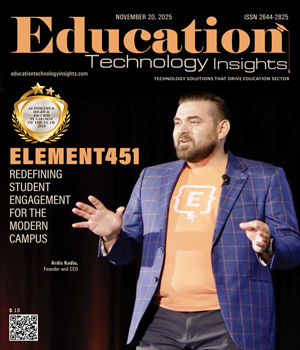THANK YOU FOR SUBSCRIBING
Be first to read the latest tech news, Industry Leader's Insights, and CIO interviews of medium and large enterprises exclusively from Education Technology Insights
Navigating The Future of E-Learning
Dr. Joshua Kim, Assistant Provost for Online Learning Strategy, Dartmouth College
Dr. Joshua Kim is an accomplished professional in the field of e-learning with years of experience teaching both offline and online courses in sociology, marketing and leadership in higher education. He is a senior teaching professional for academic transformation, learning and design at the Center for New Designs in Learning and Scholarship at Georgetown University. He is also one of the founders of Quinnipiac University Online.  Dr. Joshua Kim, Assistant Provost for Online Learning Strategy, Dartmouth College
Dr. Joshua Kim, Assistant Provost for Online Learning Strategy, Dartmouth College
In an interview with Education Technology Insights, Kim sheds light on the leading trends and challenges impacting the e-learning space.
Can you briefly outline your background and the professional path that led you to your current role?
My career began in traditional academia with a Ph.D. in sociology and demography, where I started as a professor focused on teaching and research. Along the way, I started integrating digital tools into my teaching, sparking my interest in the way technology was reshaping the education landscape. This fueled my ambition to transition from traditional academics to choosing different leadership roles in online and digital education, eventually landing me at Dartmouth College after 25 years of my professional journey.
What are some of the leading trends that you have observed in the e-learning space and how can the industry keep pace with them?
The pandemic had a significant impact on the educational landscape. One major trend post-pandemic is the blurring of boundaries between face-to-face and online learning modalities. Today, every educational institution actively leverages the capabilities of digital tools and platforms.
Amid this convergence, a fundamental obstacle is to foster meaningful relationships between educators and students. Regardless of the mode of study, building these strong relationships is crucial. Furthermore, there is an imperative to address the issues of accessibility and affordability of higher education. I firmly believe that digital tools hold a lot of promise to meet that goal.
Can you share details on any of your recent project initiatives?
A notable initiative is the launch of its inaugural fully online master’s degree program in engineering at our Thayer School of Engineering at Dartmouth. Even though our university has numerous hybrid degree programs, this one is our first program that is fully online. It eliminates the need for physical presence on campus and expands the possibilities to provide education beyond geographical boundaries.
We’re using virtual labs and classrooms where students will be provided with materials and equipment to do handson work. Its fully online nature makes learning less expensive and rules out the limitation of classroom space with its capability to scale up to meet the demands of the education.
How do you envision the future of education and what advice would you give to your peers and upcoming professionals in the space?
I foresee a future where higher education will be an integral mix of traditional offline classrooms and digital learning environments. Face-to-face instruction will continue to hold significance, especially for students seeking an immersive college experience. Educators must strive to extend the benefits of residential education to a broader audience.
Leaders in the industry have to invest in cost-reduction initiatives to make digital tools and virtual classrooms accessible and affordable to all students, even for residential classes. The considerations should include actions for reducing student debts and lowering the cost of higher education.
A significant trend gaining traction in the educational realm is the integration of generative AI into education. Institutions across the world are actively incorporating AI into course designs to equip students with essential skills for the evolving job market. AI will create more personalized learning experiences and is poised to revolutionize education by optimizing learning outcomes.
It's also vital to recognize the importance of incorporating virtual and digital components into residential campuses. This is already extensively utilized in many master’s programs and alternative online certificate courses. To effectively navigate this landscape, institutions must commit to long-term investments in digital infrastructure. Educators must embrace this transformation with forwardthinking strategies, ensuring a seamless integration of both modes to provide an inclusive and high-quality learning experience for all students.
Read Also
Designing Engagement That Lasts
Digital Creativity as a Catalyst for Deeper Learning
Protecting Precious Cargo: A Comprehensive Look at School Bus Safety
Student Employees: Your Next IT Investment
How Simmons University Is Reinventing itself and Making History With a Concentration In Women's Sports Management & Leadership
From Access to Belonging: Building a New Blueprint for Engagement and Equity

I agree We use cookies on this website to enhance your user experience. By clicking any link on this page you are giving your consent for us to set cookies. More info























